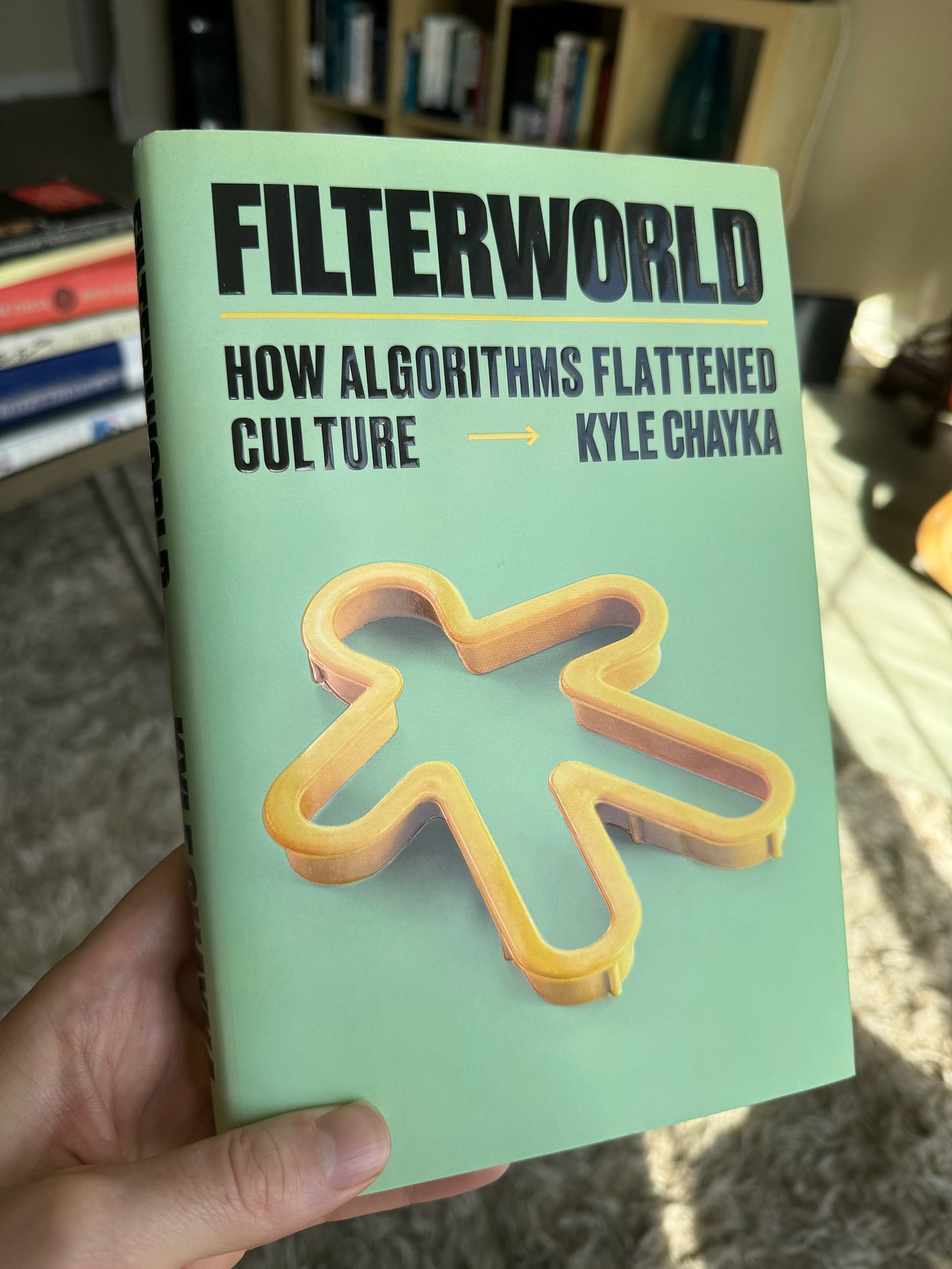Notes from FILTERWORLD
Why social media algorithms are a poor substitute for person-to-person recommendations.
Last week I had the chance to read Kyle Chayka’s book Filterworld: How Algorithms Flattened Culture. A staff writer for the New Yorker, Chayka describes how algorithmic recommendations control the majority of what we see and hear online. But what have we lost when Netflix recommends our next movie, Spotify makes the playlist, or Amazon decides the “best” books?
Here are some of my notes from Filterworld.
Tyranny of Sameness. I suspect that many of us have scrolled through videos on Facebook, Instagram, or TikTok and found the experience deeply unsatisfying—even though those videos have millions of views. Chayka observes that the culture that thrives in Filterworld is accessible, replicable, participatory, and ambient. Since raw data is the only metric that AI understands, the feed rewards content that is similar and simple. Creators know that fighting the algorithm can prevent them from finding an audience for their work, so they are incentivized to provide dumbed-down content that nonetheless satisfies the feed. This restricts the conditions for making good art, which is rarely the product of “playing it safe.”
No Accounting for (Human) Taste. Chayka argues that AI filters are unable to distinguish quality, since quality is inherently subjective. For Chayka, taste is not purely quantitative—like rating a book out of five stars on Goodreads—but relational, and something only humans can develop. “If something suits our taste, we feel close to it and identify with it, as well as form relationships with other people based on it,” Chayka writes.
Digital Cleanse. In my favorite chapter of the book, Chayka cuts himself off from all digital apps that use filters and embarks on a total “algorithm cleanse.” At first he experiences some minor side effects from the dopamine withdrawal. But soon, he finds himself experiencing great benefits, becoming more intentional about the articles he reads and the music he listens to.
We Need to Collect (Not Passively Consume) Culture. For centuries, people literally collected pieces of culture—adding physical books to their personal library, bringing home souvenirs from their travels. But collecting is increasingly rare in today’s digital world, where content is automatically delivered but rarely retained. Since reading Filterworld, I’ve been trying to practice being more intentional in selecting what I read and watch, while also thinking of ways to physically collect culture in the form of books and handwritten notes.
Why Human Curation is a Better Model. Which would you prefer? Having your friend recommend your next book to read (or TV show to watch, or album to listen to . . .) OR having an algorithm automatically recommend a piece of content to you. I’ve always had the intuitive sense that a friend’s recommendation was better, though I’m not sure that I could quickly explain why before reading Filterworld. Chayka describes such person-to-person recommendations as “social and moral acts.” Recommending art to one’s fellow humans is something that brings us all together. We can’t afford to lose that sense of community, which is yet another reason we can’t outsource curation to the machines.
Read more about Filterworld on Chayka’s site.
N.B. My novel The Editors is being published August 6, and is now available for preorder at Barnes & Noble, Bookshop.org, and Amazon. My publisher also has a limited number of advance reader copies (ARCs) that will be shipped out in May. Drop me a note if you’ve preordered the book and would be interested in potentially reviewing it a few weeks early!
Best,
Stephen



